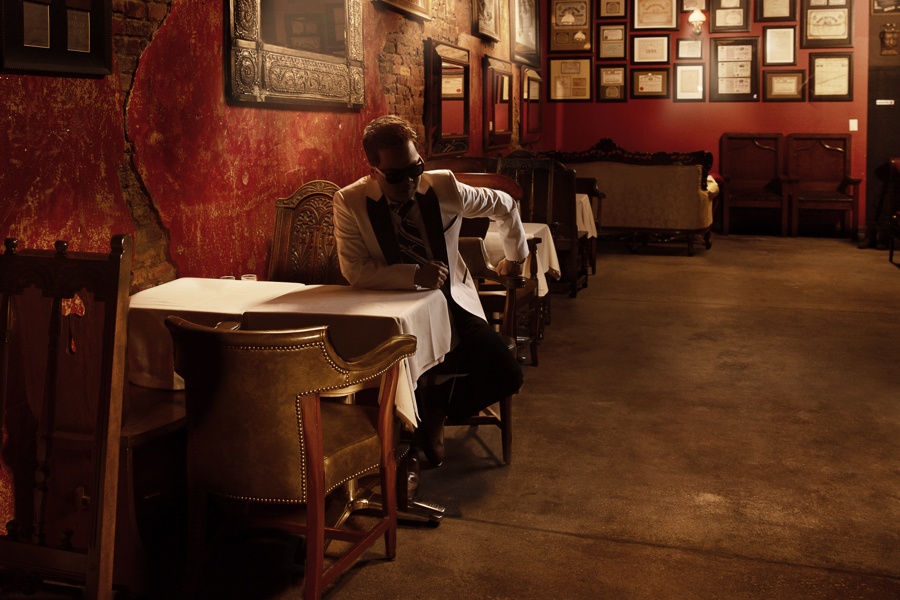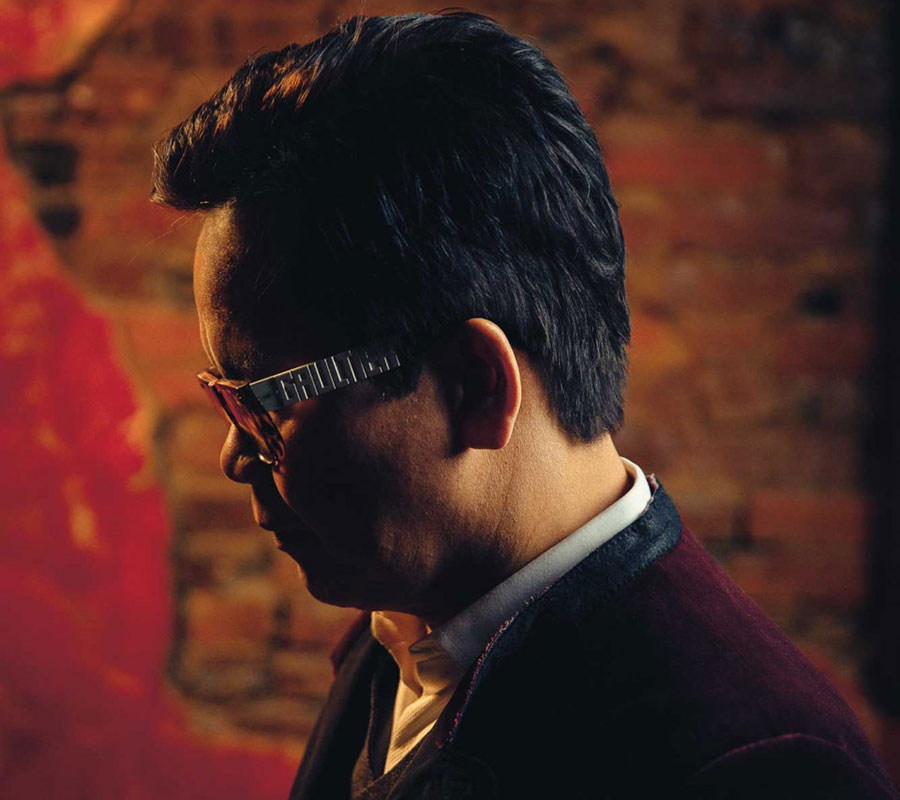After 12 Years, Amnesty for Some on Hop Sing Laundromat’s Ban List
"The real assholes are never getting back in," according to Lê, but some small-time offenders now might be welcomed back to the Chinatown bar after years of being turned away at the door.

Hop Sing Laundromat owner Lê / Photograph by James Muir
“So what do you think?”
“I think the question here is what do you think.”
“But we’re just friends. Talking. I trust you. So what do you think?”
I tell Lê again that this has to be his choice — that he has to decide for himself whether mercy and forgiveness are how he wants to celebrate the 12th anniversary of one of the greatest cocktail bars in the America.
He has spent more than a decade curating a list of people banned from his bar. There are nearly 5,900 names on it — each one meticulously recorded, marked with the composition of the party (if more than one person was involved) and the nature of the offense against decency and decorum that got a person bounced. He has maintained the list, enforced it with near-absolute rigor, made life-long enemies because of it, and brags about it (on the phone, in person, on social media) if given half a chance. But now, for the first time ever, he’s considering revisiting the crimes of the past, making some judgement calls, and offering an amnesty to certain classes of offenders.
“So you think I should do it?” Lê asks.
“I think people deserve second chances.”
“But not all people.”
“No, not all people. Some people on that list are real dicks. Fuck those people.”
That was our first conversation on the topic. We had others. But by late last week, Lê had made a decision. He was going to do it. He was going to open up the ban list and consider, on a case-by-case basis, maybe, possibly, allowing some people back through the doors. After 12 years? It seemed like the right thing to do.
May 24th. That’s the day he considers Hop Sing’s birthday. It wasn’t the first night of service — that would’ve been sometime in February of 2012, a weird, one-off service that was as memorable as it was mind-blowing. But the first night that he unlocked the gates and started allowing people to just wander in. He did it, deliberately, on the day before the start of Memorial Day weekend, knowing that the entire city would be emptying out and heading down the Shore, hoping that no one would actually show up. But people did. Lots of people. And both the bar (and the ban list) have been operating ever since.
I ask Lê is there was anything he’d learned over the past 12 years, anything he’d like to share. And, unsurprisingly, he has an answer already teed up.
“It’s a privilege,” he tells me, stammering a little, trying to find exactly the right words. “At the beginning, I didn’t get that. But now? Now I do. It’s a privilege to be able to do this, to provide this place for peoples.” He talks about how, in the beginning, he didn’t even really understand what he was trying to do with Hop Sing — with the rules against cell phones and selfies, hats and sneakers.
But after more than a decade of service (and after being there to open the bar, work the door and close again every single night, without fail) he’d come to see that for his fans and for the people who love the place, he was providing “a place to get lost for an hour or two.” A place without TVs or cell phones to distract anyone, where you can sit with your friends and be present, have an actual conversation and some of the best cocktails you’ve ever had.
“Ninety percent appreciate what we do,” he says. “Ninety percent. They understand it, Jason.” Or anyway, they do now. Because, in the beginning, it wasn’t like that. On the phone, he rages for a while at the haters (which, if you know Lê, you understand is a common digression for him, as natural as breathing). “Everyone said we wouldn’t last six months,” he says. And he’s right; I remember it. With all his rules and his weirdness, I was probably one of them. “And we proved every single fucking one of you fuckers wrong.”

The bar at Hop Sing Laundromat / Photograph courtesy Hop Sing Laundromat
There will always be people who don’t get it, he insists. People who will hate the place for their own reasons, who can’t — or won’t — follow the rules. “You don’t like it? Don’t come,” he says, which is what he always says. The rules are meant to maintain a certain environment on the other side of Hop Sing’s front door — both for the customers and the staff.
He tells me that he adds to the list every week. Not every night necessarily, (except sometimes it’s every night), but it never stops. Almost 5,900 names in 12 years? That’s a lot of people banned. But there’s a reason for every single one of them. Someone mistreats the staff? Gone. Gets too loud or worked up? Gone. Takes a picture inside the bar? Gone. Posts that picture on social media? SUPER gone.
And Lê remembers. He checks every single person’s ID at the door, shakes peoples’ hands as they leave to make sure he has the names right. He’s as sure as he can be before he adds a name, because once you end up on Hop Sing’s ban list, you’re on it for life.
A lot of the names on the list are there for being bad tippers. “A 30-cent tip on a $59.70 bill, Jason? They do that. They do that all the time.”
For a while, we talk about tipping. We’ve both got some years on us, so we remember when 15 percent was the standard. We both remember parents who were scrupulous about it — doing the calculation on a napkin, figuring the amount to the penny. Later, 20 percent would become the polite amount. These days? Things are different. With minimum wage battles, pay stagnation, the gutting of the restaurant industry by COVID and the way that we, as a society, demanded that cooks and servers risk their lives daily just to bring us beer and cheese fries while we breathed plague all over them? I aim for 25 percent on any tab under $150, and never less than $10. Enough to be kind, not so much that it feels weird. And Lê says yeah, that’s reasonable. No one’s gonna look sideways at a 25 percent tip.
But at Hop Sing, he gets people who tip nothing. He gets people who leave the change, rounded up to the nearest dollar. You don’t go on the list for leaving a few bucks, even if it’s under the socially acceptable percentage, but when someone leaves one of his servers a nickel or a quarter, he just has them bring it right back to the table, leave it there, and the name goes on the list.
The bar is cash-only, so that makes it easy for the cheapskates to just drop a couple bills and walk out. But he also gets a lot of groups of three or four or six. He gets a lot of first dates. And no matter how careful he is, there’s no way for him to reasonably tell who, exactly, is the asshole in the party, so his policy has just been to ban them all.
“Because I believe that morons hang around with morons,” he says. And guilt by association has been the law of the land for as long as Hop Sing has been serving. He tells me that people come to his door every week trying to get their names expunged from the ban list. They say that they were on a bad date with someone who stiffed the server and that they never spoke to that dude again; that they had a dumb friend who took a selfie in the bathroom or a sly snap of the bar that they didn’t even know about. And with one single, solitary exception (a woman who apologized for her friend’s bad behavior, showed up at the door for weeks on end, and eventually delivered a hand-written letter of apology to Lê), he has never wavered.
Until now.

Lê, the owner of Philadelphia cocktail bar Hop Sing Laundromat / Photograph by Justin James Muir
Starting today — the minute this piece goes online — Lê has decided that certain offenses will be reconsidered. Bad tippers (or the ex-friends of bad tippers) can show up at the door and might be let back in to prove that they have changed their ways. The majority of people on the list got there because of some sort of tipping-related offense, so that’s a large group of pardons. Also, if someone in your party got busted for whipping out a camera at the bar and got your whole party banned? That might be reconsidered as well.
Couple things to consider: This amnesty only applies to offenses committed during Hop Sing’s first nine years of business. If you made the list in the past three years, you’re out of luck. You’ve still got some more time to serve yet. Also, if one of the above offenses was coupled with any additional dickish behavior — if you yelled at the staff, talked shit online, left a bad review or anything of the sort — don’t bother trying. You’re still going to be out in the cold.
“Fair?” Lê asks.
“Fair,” I tell him. “People can change. Usually, they don’t. But they can try.”
And Lê agrees. The ban list has a purpose, he tells me. “I believe in what we do. And the ban list is there to keep out the imbeciles.” But he has also learned some thing over the past dozen years.
“I learned to love this city,” he says. “These Rocky fanatic motherfuckers.” Actually, he says, he looks at it now like a longterm relationship. Like a marriage between two people who have really seen some shit in their time. “You learn to understand and to tolerate things. It’s like, you’re a fucking idiot, but I love you. I’ve learned to love Philadelphia for what it is. And if I had to say anything to anyone trying to do what we did today, I’d say it’s windy at the top. Keep both feet on the ground. And don’t forget to dress warm, motherfucker.”
So best of luck to all you small-time offenders out there. Just remember: Hop Sing’s list is extensive and well-documented. Like Santa’s naughty list, it always gets checked twice. But now is the moment to take a chance and see what happens. Maybe you’ll get lucky.
And don’t forget to tip your server.


